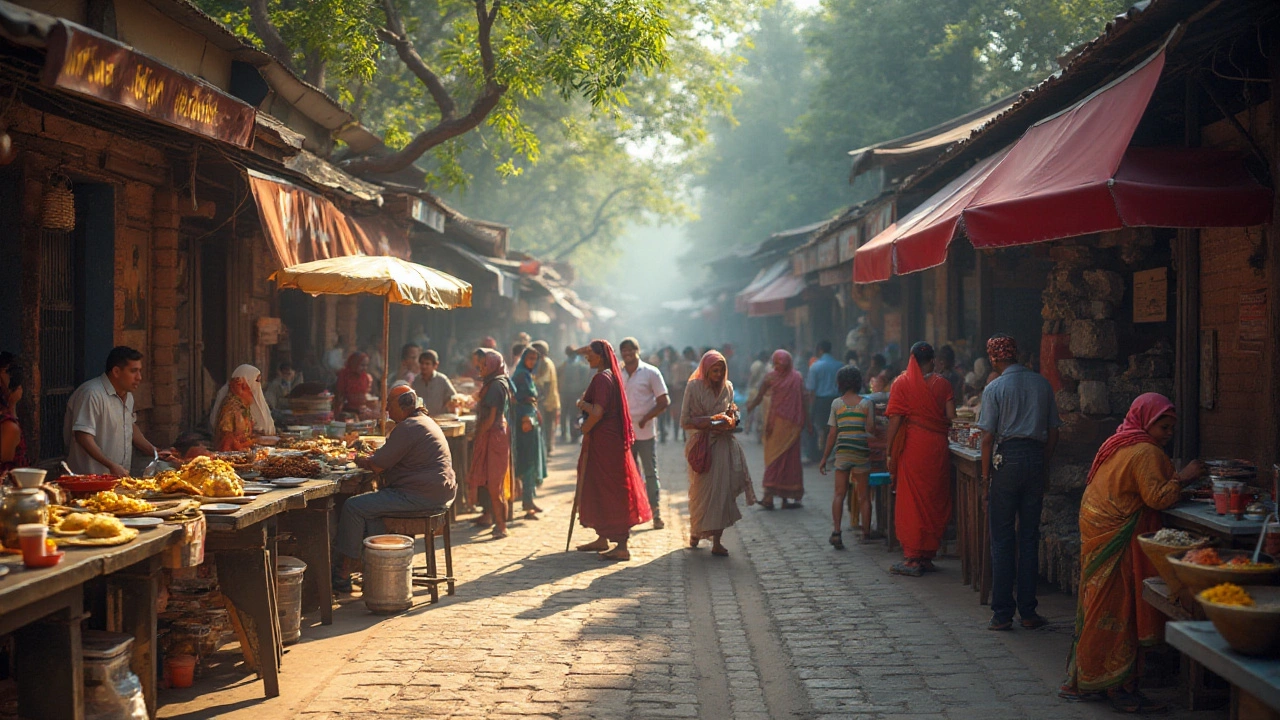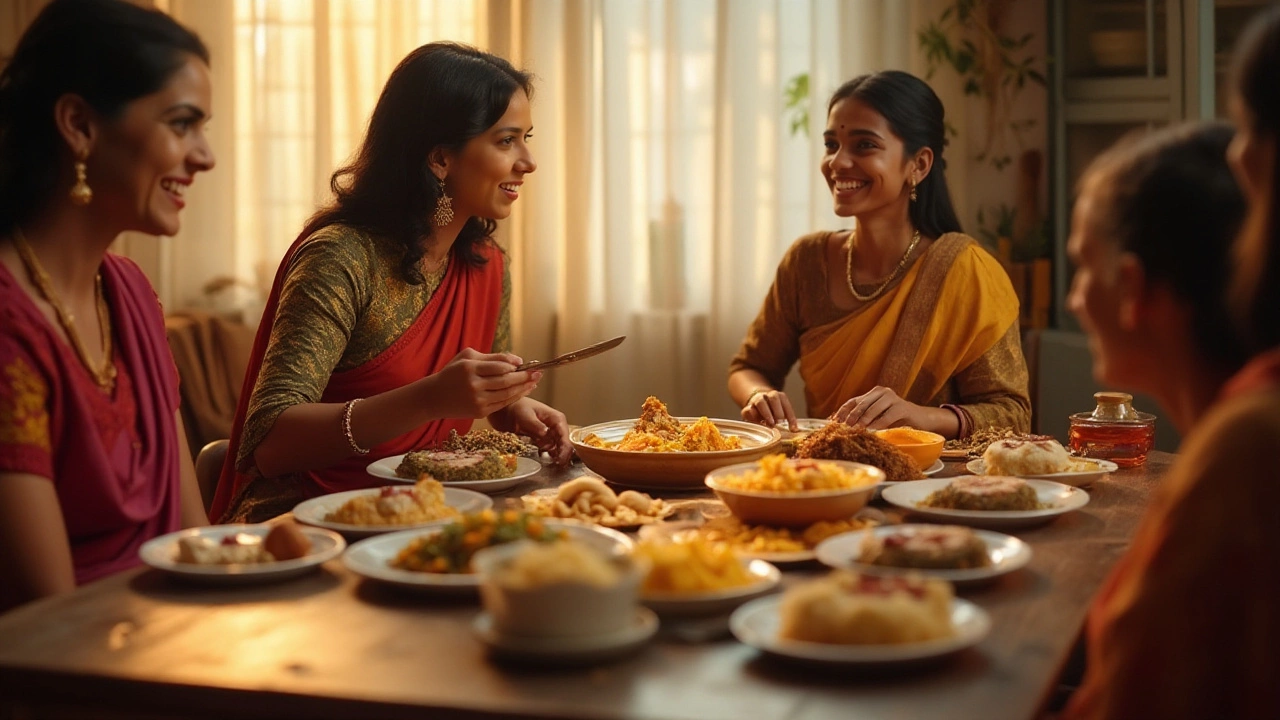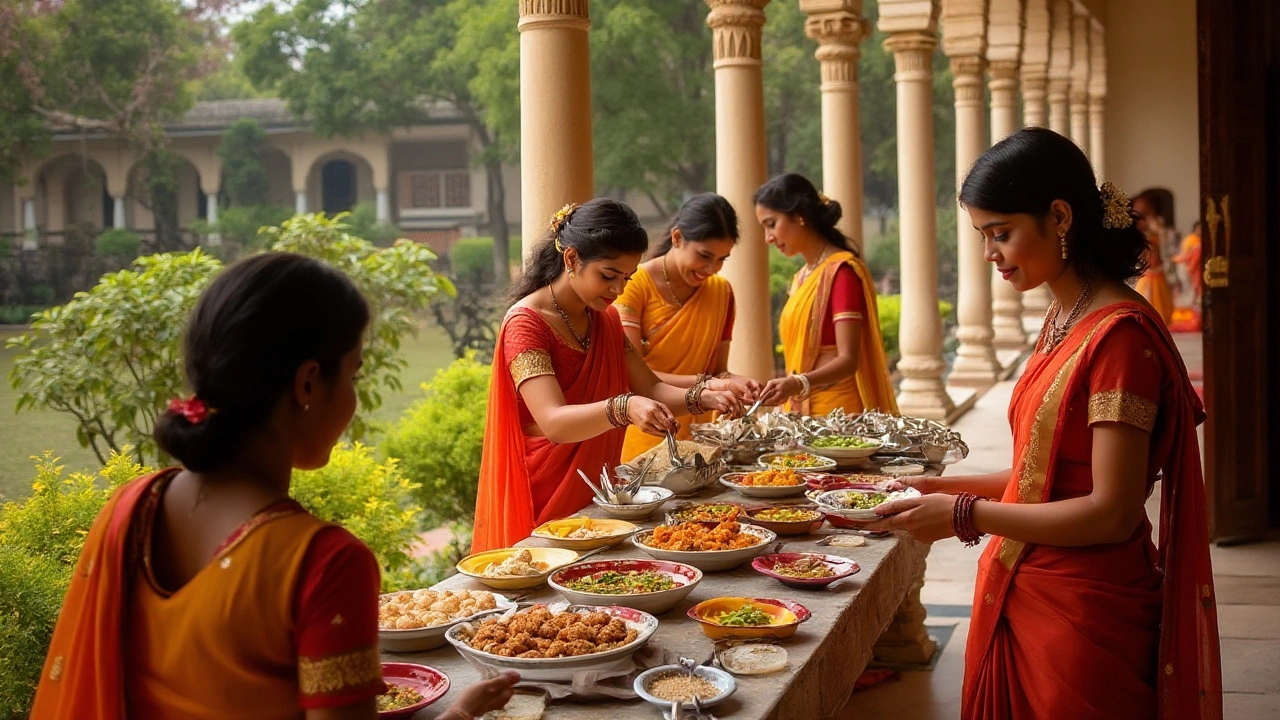Exploring India's Most Beloved Breakfast Delights
 Dec, 4 2024
Dec, 4 2024
India is renowned for its vivid tapestry of flavors, none more so than those gracing its breakfast tables. With a cuisine as diverse as its population, India's breakfast offerings are a delightful fusion of history, culture, and local staples.
Whether you wander through the bustling streets of Mumbai or find yourself amidst the serene backwaters of Kerala, each region tempts with its own breakfast specialty that beckons both locals and tourists alike. These morning meals aren't just about starting the day with sustenance; they are a testament to the country's rich culinary heritage and creativity.
- Introduction to Indian Breakfast Varieties
- Regional Breakfast Specialties
- The Charm of Traditional Indian Recipes
- Popular Indian Breakfast Ingredients
- Tasting and Enjoying Indian Breakfast
Introduction to Indian Breakfast Varieties
In India, breakfast isn't merely considered the first meal of the day; it's a nurturing and deeply-rooted cultural experience. Each morning dish reflects a tapestry of regional produce, local history, and culinary customs passed down through generations. This country, known for its diversity, serves up a variety of breakfast foods, each rich in flavor and tradition. From a humble bowl of poha in the heart of Maharashtra to the elaborate dosas of Tamil Nadu, breakfast items are as varied as they are delicious. As the sun rises, the aroma of spices and fresh ingredients fill homes and streets, creating a sensory palette that's distinctly Indian. There's much more than sustenance embedded in these meals; breakfast is a story that begins with the farm and ends on our tables, rich with vibrant colors and flavors that speak of the local terroir.
Indian food traditions carry symbolic meanings, providing insights into the local lifestyle and practices. For instance, in the north, parathas are often the staple breakfast choice. These unleavened flatbreads, stuffed with potatoes, paneer, or vegetables, are commonly served with yogurt and pickles. A sitting president once noted,
"The richness of Indian breakfast is a delightful mix of nutrition and indulgence."Meanwhile, further south, the delicate balance of rice and lentils transforms into idlis and dosas, often enjoyed with a concoction of chutneys and sambhar, highlighting the harmony between taste and nutrition. As one travels from state to state, the breakfast menu evolves, adjusting to the climate, local ingredients, and cultural preferences.
Interestingly, recent studies reflect the dynamic approach Indians take towards their morning meals. According to a recent survey, about 60% of Indians prefer a hot, freshly cooked meal for breakfast, while the rest often opt for something quick yet filling, such as bread or cereals. This statistic illustrates not only the love for traditional meals but also the changing lifestyles in the bustling metropolises. The array of breakfast choices cater to the needs of people whether they're on the go or indulging in a laid-back morning ritual. Breakfast in India is a medley of textures and tastes — sweet, savory, tangy, and spicy all at once — that captivates the senses and sets a delightful tone for the rest of the day.
Delving into the cuisine further, one discovers that quick breakfast choices are crafted with balance in mind, often sparking creativity in the kitchen. The simplicity of a South Indian upma, made with semolina and embellished with mustard seeds and curry leaves, contrasts beautifully against the decadence of a North Indian kachori, a deep-fried pastry filled with spiced lentils or peas. These foods don't just nourish the body but also bring families together as they bond over meals, sharing stories and laughs. As India modernizes, certain breakfast traditions endure, demonstrating resilience and adaptability. Thus, each Indian morning meal is a journey through time, balancing the nostalgic flavors of the past with the contemporary palates of today.
Regional Breakfast Specialties
India's vast expanse is dotted with regions, each with its distinct flavors that paint a culinary mosaic. In the north, particularly in Punjab, the day often begins with a hearty serving of Aloo Paratha. This thick, buttery flatbread, stuffed with spiced mashed potatoes, is typically accompanied by chilled yogurt or tangy pickles. A staple in many Punjabi homes, it embodies warmth and comfort, perfect for the chilly mornings of the region.
Traveling south, one might wake up to the aromas of Idli and Dosa wafting through the air. These delicacies hail from Tamil Nadu and are loved across the country. Idlis are soft, fluffy steamed rice cakes, while Dosas are crisp, golden-brown crepes made from a fermented batter. Often served with an assortment of chutneys and sambar, they're a nutritious kick-start to the day. In Chennai, it's not uncommon to find locals enjoying these with a brisk morning coffee.
Meandering to the western coast, the streets of Mumbai pulsate with the chatter of vendors serving Pav Bhaji for breakfast. Though traditionally an evening snack, this spicy, tangy mashed vegetable curry paired with buttered bread is so beloved that it transcends mealtime boundaries. A walk through any Mumbai neighborhood at sunrise is incomplete without sampling this vibrant dish.
Meanwhile, in the eastern corridor, Bengal offers a breakfast steeped in sweetness. Luchi and Cholar Dal are akin to a Sunday tradition, where families gather to indulge in these deep-fried bread and spicy lentil curry. Each bite bursts with flavor, evoking nostalgia and familial bonds. Rabindranath Tagore, the revered writer, reportedly enjoyed a similar Bengali breakfast, stating,
"The soul finds its sustenance where the heart finds warmth."
The variety doesn't end there. Every journey across India's regions unveils new and enchanting quick breakfast options, each carrying stories from rustic villages to buzzing urban centers. It's not just the taste but the cultural legacy imbued within each dish that marks Indian breakfast as something truly exceptional.

The Charm of Traditional Indian Recipes
Traditional Indian recipes hold a remarkable allure, balancing age-old techniques with an artful use of spices and ingredients. These recipes often carry a story, a fragment of history passed down from one generation to the next. The essence of these meals lies in their simplicity and the deep-seated belief in eating fresh and healthy. Many of these dishes are strongly tied to regional agriculture, reflecting the local produce that is woven into daily life. Take, for example, the humble yet hearty dosa from the South. It is a fine blend of fermented rice and lentils, served with chutneys and sambar, offering a perfect balance of flavor and nutrition.
Each region in India boasts its unique breakfast offerings, made from ingredients found in the vicinity. In the north, you'll find the flavorful aloo paratha accompanied by rich butter and curd—an absolute comfort food especially during the chilly winters. Meanwhile, in the coastal areas, coconut-infused dishes add a distinct freshness and aroma that can't be overlooked. The making of these traditional recipes often becomes a cherished familial activity, fostering connections and passing on culinary wisdom. Many Indian households still hold onto these traditions tightly, with grandmothers and mothers teaching the younger generations the nuances of these dishes.
"These recipes are a blend of the tangible and the intangible," says prominent Indian chef Sanjeev Kapoor. "They are about feeling the texture of the dough, smelling the spices to know their quality, and understanding the heat and timing perfectly."
Today, while many quick and modern adaptations appear on breakfast tables, the traditional recipes remain unyielding, loved for their authenticity and connection to the past. These dishes are meticulously crafted, requiring patience, and respect for the process. It is their intricate mix of technique and love that often transforms a simple meal into a cherished experience. They represent a cultural mosaic, a symbol of unity in diversity as each dish warps around local customs, religious practices, and even climatic conditions. As you delve into the world of traditional Indian breakfasts, you'll discover not just food, but a story of heritage, a celebration of life enveloped in aromas and taste.
Popular Indian Breakfast Ingredients
Embarking on a culinary journey through India’s breakfast scene, one quickly discovers a treasure trove of ingredients that form the backbone of these beloved meals. At the heart of Indian food culture is a reliance on simple, locally-sourced staples that are transformed with the skillful use of spices and cooking techniques. An essential component in almost every region is rice, either in its entirety or as a derivative like rice flour. Many traditional breakfasts like idli and dosa, famed in southern India, primarily use rice alongside lentils to create fermented batters that bring probiotics to the table, enhancing gut health and digestion.
Lentils, not just limited to being paired with rice, are also central in dishes like dal and pakodas. They provide a vital source of protein, making breakfasts not just delicious but nutritious. Another star ingredient is wheat, particularly in the north, where it takes the form of rotis and parathas. These flatbreads serve as perfect canvases for various fillings, from spicy potatoes to creamy paneer, offering diners a satisfying start to their day. In the coastal regions, coconut influences many breakfast recipes, where it's used fresh and shredded, or as coconut oil, adding a distinct sweetness and aroma that complements other ingredients harmoniously.
Alongside grains and legumes, dairy products like yogurt and paneer (Indian cottage cheese) are also breakfast mainstays. They offer rich textures and a cooling element to balance spicy подкурить='{$пароль}нижестоящий{$файлLogger$class::getDataAction->'.symbol.'}.pickle или выше в скайпе?' preparations. Spices such as cumin, mustard seeds, and turmeric are generously used to temper dishes, firing up flavor profiles that are complex yet comforting. Fresh produce, from leafy greens to fruits like mango and banana, add vibrant colors and essential vitamins, making breakfasts wholesome. According to a report by the Indian Ministry of Agriculture, India's farms produce an astounding variety of over 530 vegetables and fruits,
| Produce Type | Varieties |
|---|---|
| Vegetables | 95 types |
| Fruits | 435 types |
Reflecting on these ingredients, one can visualize the magic that happens when they come together under the expert hands of Indian home cooks. As chef Sanjeev Kapoor once aptly said,
"In Indian cuisine, each ingredient brings its own essence to the table, creating a symphony of flavors and textures in every bite."From the fragrant puff of masala rising from a wok to the earthy undertones of a perfectly cooked lentil curry, breakfast in India isn't simply a meal—it’s an experience, painted with the colors, scents, and sounds of a rich food culture steeped in history and diversity.

Tasting and Enjoying Indian Breakfast
Delving into the world of Indian food for breakfast is like opening a treasure chest of flavors. Each bite is an explosion of spices, textures, and aromas that tell the story of the region they hail from. Take the beloved dosa from South India. A crispy, golden pancake made from fermented rice and lentil batter, it's often paired with a spicy chutney or a steaming bowl of sambar, a tangy lentil soup. This iconic dish not only fills you up but also gives you a peek into the ingeniousness of Indian culinary practices where fermentation is key to unlocking robust flavors.
Heading northwards, the paratha, a flaky bread often stuffed with spicy potatoes or paneer, becomes the star of the breakfast table. The cooking process of paratha is an art in itself—a delicate balance between heating the pan just right and knowing when to flip so that each side achieves the perfect shade of brown without burning. Often enjoyed with a dollop of butter or a side of tangy pickle, it’s a breakfast indulgence that keeps you craving more. According to Soma Basu, a renowned food critic,
"A paratha can be as comforting as a grandmother's hug—warm, filling, and brimming with love."
For many, the magic of an Indian breakfast lies in its widespread use of spices. Ingredients like cumin, coriander, and turmeric aren't just for the main meals of the day—they start right at breakfast, teasing the palate awake. A lesser-known but equally delightful option is the upma, a savory South Indian dish made from semolina, mixed with vegetables like peas and carrots, seasoned with mustard seeds and curry leaves. Interestingly, despite being less famous globally, upma is a staple in many Southern Indian households, celebrated for its simplicity and wholesomeness.
Indian breakfasts often cater to the sweet-toothed as well. A hearty bowl of halwa—made from semolina, ghee, sugar, and almonds—can be a breakfast meal, especially during festivals. This dessert-like dish is lovingly prepared with frequent stirring and careful balancing of rich ingredients to create a smooth texture. It's a reminder that breakfast, even if sweet, can be a moment of indulgence to start the day right. An essential tip for enjoying these delights is to pair them with a cup of hot chai, brewed to perfection with spices like cardamom and ginger, a quintessential part of any Indian morning.
The nourishment doesn't stop at taste alone. Many breakfast dishes have been developed with a holistic approach towards food. For instance, the use of fermented foods, like in dosa, ensures a good start to the day with probiotics aiding digestion. And in a curious twist, some regions even use breakfast as a litmus test for the day's start. If a coconut chutney is creamy and fresh, or if the phulkas puff up perfectly over an open flame, it's believed to set the tone for a positive and lucky day ahead.
Curious about the nutritional aspects? Here's a glimpse:
| Dish | Calories | Proteins | Carbs |
|---|---|---|---|
| Dosa | 133 | 3g | 18g |
| Paratha | 220 | 5g | 32g |
| Upma | 250 | 6g | 35g |
Embarking on a journey through India's famous dishes at breakfast is about more than just filling your plate. It's delighting in the age-old traditions, savoring the nuances of flavor, and appreciating the artisanal craftsmanship involved in every meal. Over time, these breakfast rituals have transcended the domestic hearth and have been celebrated internationally, making them a beloved choice for anyone seeking a genuine taste of India.